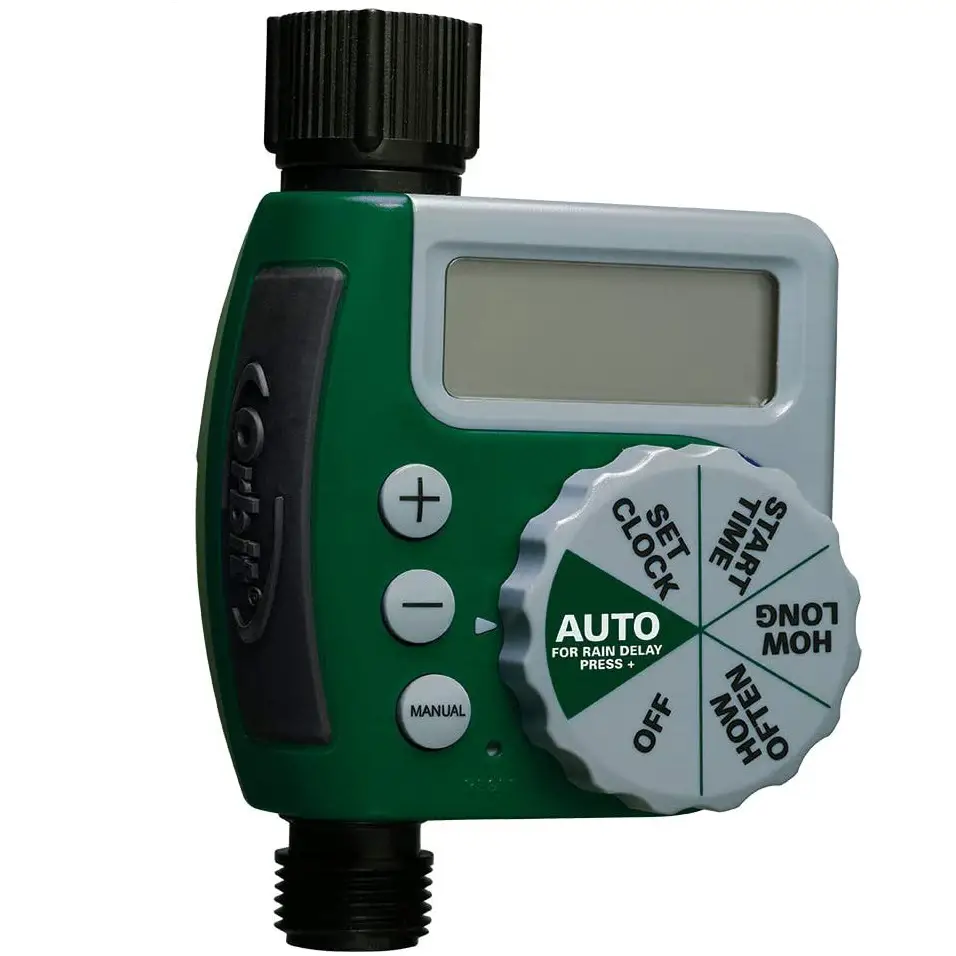
- Color Green
- Brand Orbit
- Material Plastic
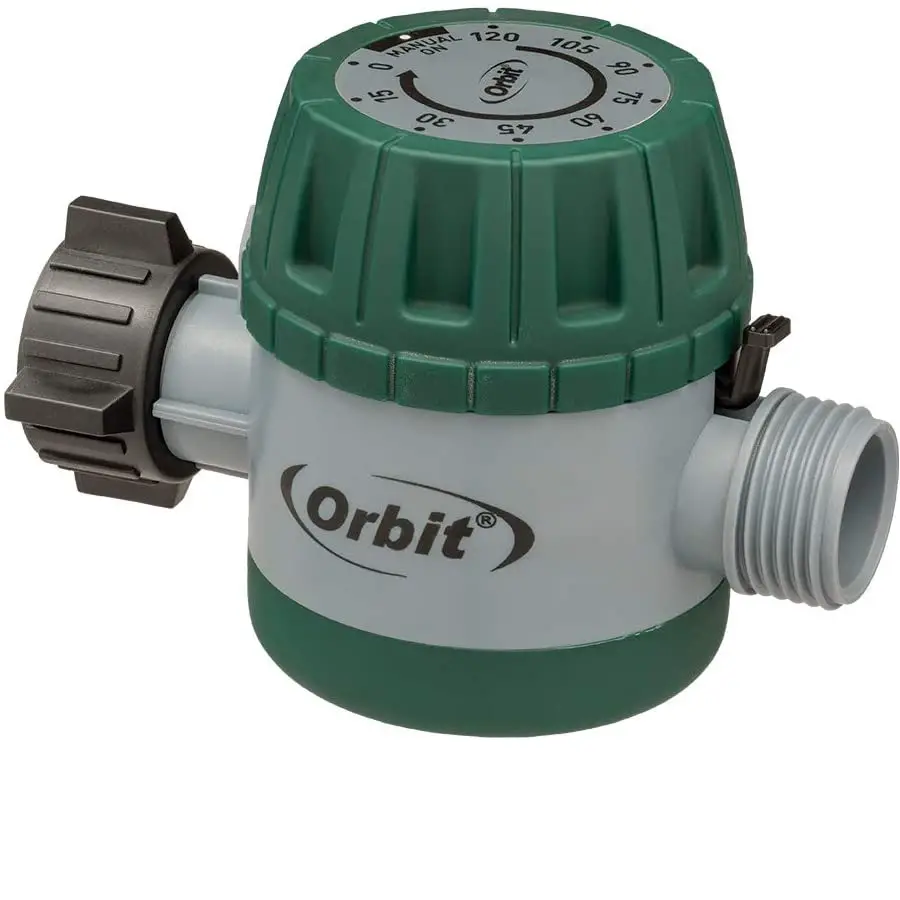
- Colors May Vary
- Brand Orbit
- Dial
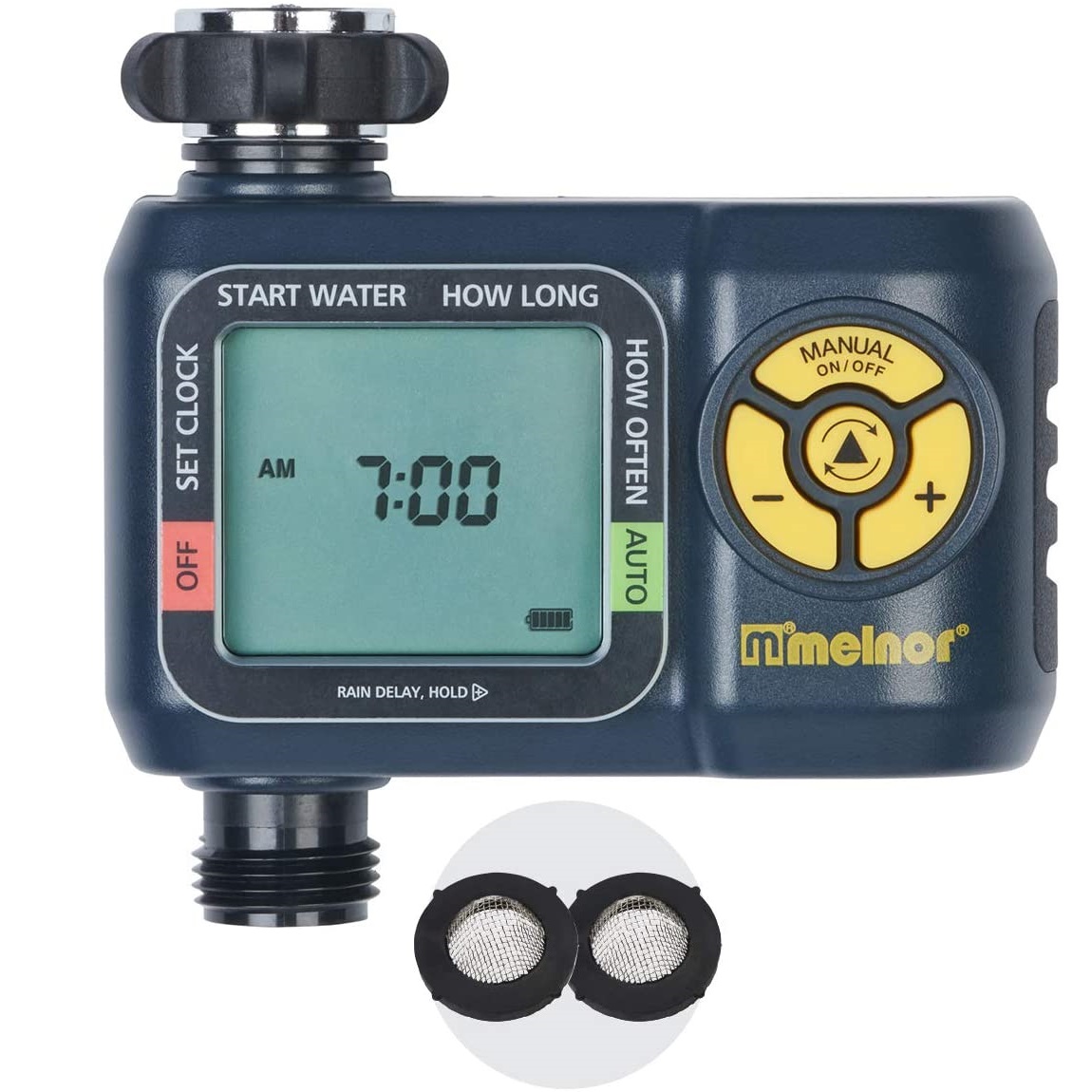
- Brand Melnor
- Material Plastic
- 2.44 x 5.19 x 5.11 inches
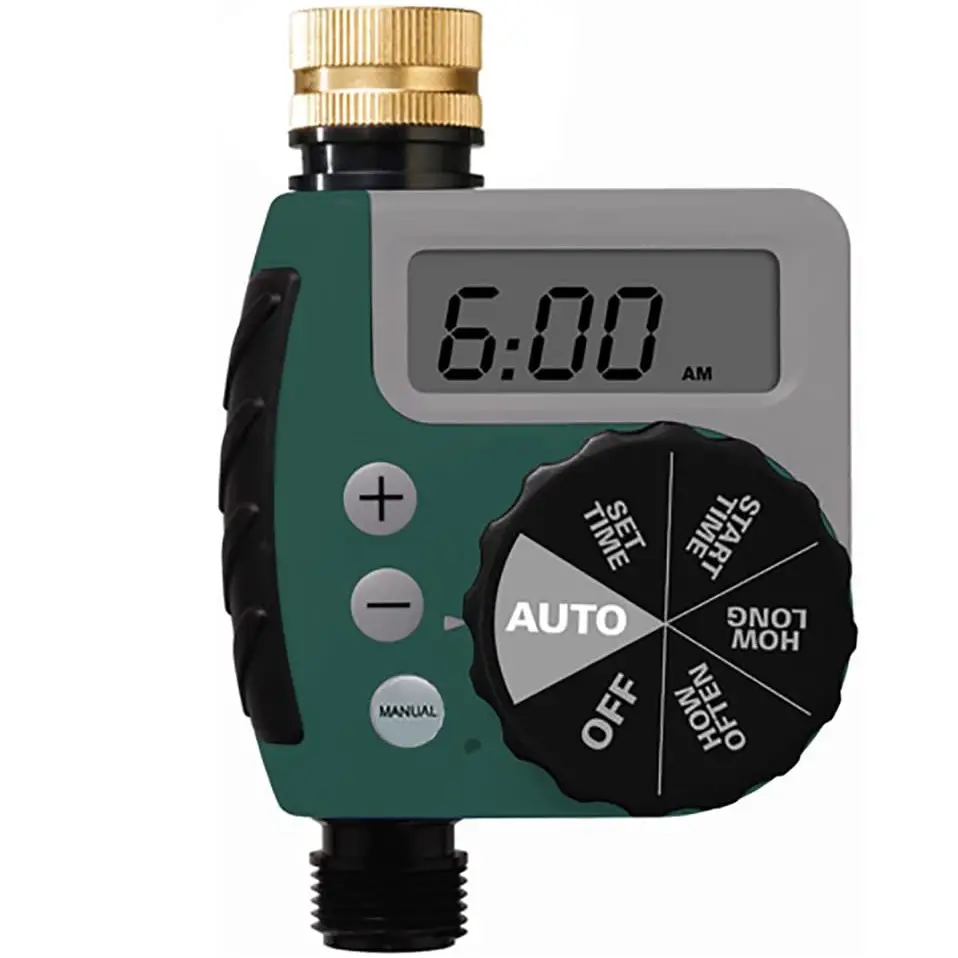
- Brand Orbit
- Material Plastic
- 0.9 Pounds
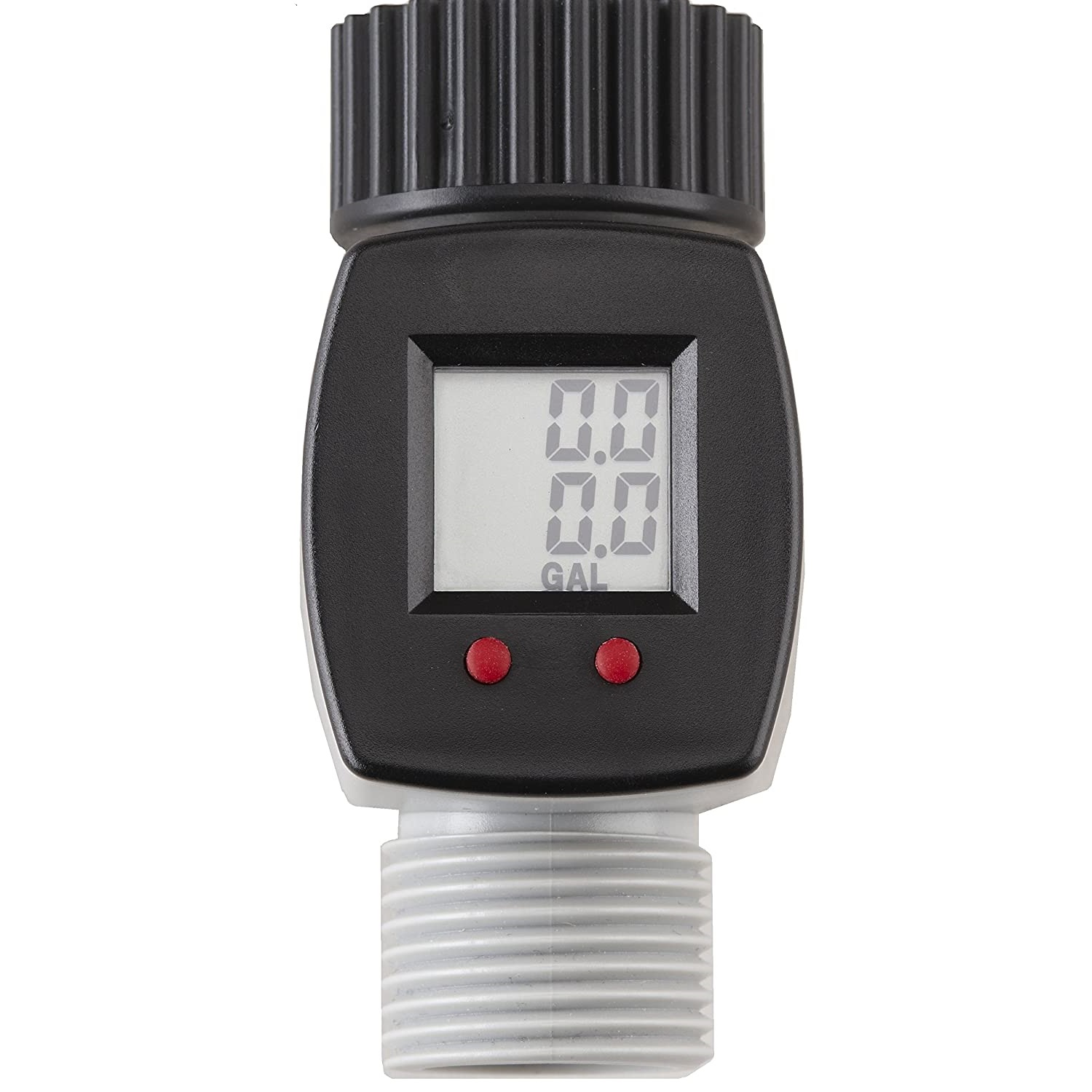
- Brand: Rainwave
- Item Weight 2.39 ounces
- 8.75 x 4.25 x 2 inches
Choose the Best Hose Timer
Customer’s Choice: the Best Rated Hose Timers
17 users answered this survey. Please help us improve this review!
Do you want to save time and money? If so, then a hose timer is an essential tool for your car wash or backyard! A hose timer allows you to control the water flow coming out of your hose. It’s useful because it saves energy by turning off the water when not in use.
A hose timer is a tool used to automate your garden watering system. It can be set for the right amount of water and frequency, saving you time and money. They are also great for those who forget or are away from their home often because they will never run out of lawn care resources if properly installed with a rain sensor (in order to shut off when it rains).
Further, the experts discuss some of the favorite buyer’s tips about the best hose timers like how to get them set up properly and what features are most important before buying one yourself! Do not forget to check the top hose timer reviews.
Table of Contents
Orbit 62061Z Single-Outlet Hose Watering Timer – the Editor’s choice!
 There are many ways to save water in a drought out there. The best way is not to turn on your hose for an hour every other day. It sounds like a plan, with the Orbit 62061Z Single-Outlet Hose Watering Timer you can have that 16 hours of scheduled time during the week with no need for any manual watering, unless it’s raining.
There are many ways to save water in a drought out there. The best way is not to turn on your hose for an hour every other day. It sounds like a plan, with the Orbit 62061Z Single-Outlet Hose Watering Timer you can have that 16 hours of scheduled time during the week with no need for any manual watering, unless it’s raining.
Attach it and program up to 240 minutes (4 hours) of run time at intervals from every 6 hours to once every 7 days, then set your watering schedule and call off all those manual chores again. With heavy-duty weatherproof construction, the timer won’t break down.
It also features a rain delay for water conservation, runs from 1 min to 4 hours, with a manual override switch that can override programming when needed.
This popular Orbit timer attaches to any hose fitting and gives you a consistent reach so all of your plants get watered from the same place every time. With up to 4 hours of runtime per session and 24 settings in 6-hour increments, this gardening tool that you’ll never go without again.
Orbit 62034 Mechanical Watering Hose Timer – the best for the large dial!
 You never want to succumb to forgetting the settings and letting your lawn burst into dry, brown grass so choosing a timer like this Orbit 62034 Mechanical Watering Hose Timer is wise. It features an easy dial that can be set anywhere from 15 minutes, all the way up to 120 minutes for those bigger spurts of cool water onto your hot soil.
You never want to succumb to forgetting the settings and letting your lawn burst into dry, brown grass so choosing a timer like this Orbit 62034 Mechanical Watering Hose Timer is wise. It features an easy dial that can be set anywhere from 15 minutes, all the way up to 120 minutes for those bigger spurts of cool water onto your hot soil.
This water timer is the easiest device to use and will help conserve your precious resources. It has an oversized dial that’s easy for anyone to set, even with wet hands or when your gloves are a little too big. In addition, it installs quickly and easily.
Say goodbye to rust or corrosion with durable construction materials for a perfect product in any season!
The Orbit 62034 Mechanical Watering Hose Timer saves people from forgetting to turn off their water by automatically shutting it off after the desired amount of time. It can be great for any person who needs to control water flow or is an outdoor irrigation professional looking for some convenient customer service. This durable and easy-to-use timer will help conserve water as well.
Melnor 65034-AMZ AquaTimer Digital Water Timer – the best for portability!
 The Melnor AquaTimer Digital Water Timer with 2 steel filters allows you to water as little or as often as needed. The rain delay feature pauses the watering schedule if it is not raining for up to 7 days, so you save water when a drought hits.
The Melnor AquaTimer Digital Water Timer with 2 steel filters allows you to water as little or as often as needed. The rain delay feature pauses the watering schedule if it is not raining for up to 7 days, so you save water when a drought hits.
With its easy-to-use manual option, this product doesn’t take all the work out of gardening and landscaping – it makes it easier! Keep the garden green all the time with this battery-powered timer and enjoy worry-free gardening after just one simple setup.
With help from the Melnor 1-Zone AquaTimer Digital Water Timer, you can make sure that your plants have enough water when they need it. This digital unit has a manual option as well as a flexible schedule to save water and money on your utility bills. Being battery-powered, this timer is portable and lightweight for easy use in any outdoor location or indoors with an auxiliary power outlet.
Orbit 62056 One Outlet Single-Dial Hose Timer – the best for durability!
 Give your sweet plants a break on their water usage with this easy-to-use Orbit 62056 hose timer. It features oversized buttons for ease of use, heavy-duty weatherproof construction with a brass swivel and tough powder finish, and a quick setup.
Give your sweet plants a break on their water usage with this easy-to-use Orbit 62056 hose timer. It features oversized buttons for ease of use, heavy-duty weatherproof construction with a brass swivel and tough powder finish, and a quick setup.
Simply set the delay time to meet your needs (24, 48 or 72 hours), attach to hose-end fittings using quick connect couplings and hook up to a standard garden hose.
Rotating knob permits easy timer setting in either direction for accurate water flow scheduling – the wide dial is marked in both minutes and seconds. For added convenience, this durable brass timer comes with an automatic rain delay feature that gives you the flexibility of conserving water during rainy periods.
Get in accord with your water conservation needs with the Orbit 62056 timer. It saves you a ton of trips back and forth from the house while watering your garden or washing your car. You can also program rain delays for 24 hours up to 72 hours so that when it rains, your plants don’t suffer!
Rainwave RW-9FM LCD Digital Water Flow Meter – the best for RV use!
 You won’t have to break out the calculators and math books to figure out how much water is in your fresh tank as the Rainwave RW-9FM water flor meter measures the incoming water. In L/min or GPD (Gallons per day) mode, it calculates usage while measuring flow rate with a single reading. Makes that fresh tank so much easier on you.
You won’t have to break out the calculators and math books to figure out how much water is in your fresh tank as the Rainwave RW-9FM water flor meter measures the incoming water. In L/min or GPD (Gallons per day) mode, it calculates usage while measuring flow rate with a single reading. Makes that fresh tank so much easier on you.
This electronic meter with a display panel is easy to use and provides a must-have convenience that lets you know exactly how much water has been added to your RV water tank.
The Buyer’s Guide
Hose Timer Features:
Watering zones
Some models of hose timers offer the option to water multiple zones with a one-timer. This is a great feature if you have different types of plants and shrubs in your garden. You can set up custom watering schedules for each zone as well, which will make sure every plant gets just what it needs!
To use this function, simply divide an area into several sections or grids on your yard map, then program them accordingly so that they are all watered at the same time during any given hour period (or days). The number of watering zones available varies from model to model. However, some even allow you to create over 100 separate zones.
Watering duration
A common question about hose timers is how long they water for. Some people might need a timer with an infinite watering duration, while others only want it to last a number of days or weeks before coming back around again.
Watering duration is the most important factor in determining how often you should use your timer. The more frequently you water, the less time each watering session should be. To find out what’s best for you, simply divide a day into equal hourly blocks and then list all of your tasks on those lines (e.g., cooking breakfast). This will give you an idea of how much time on average a task takes to complete and which ones are run concurrently with others that can afford to wait longer before they need to be watered again.
Mechanical vs digital hose timers:
1) Mechanical devices
Mechanical timers are the original type of hose timer. These work by using a plastic, metal or rubber gear that will rotate and turn off your sprinklers at the time you set them for – just like an old-fashioned clock! The disadvantage to these is they do not have many “automatic features”. The only option that can be changed on a mechanical timer is setting the start and stop times. This makes it difficult when watering different areas with varying lengths of days because all timers must run for 24 hours instead of being able to adjust the settings based on location, soil moisture & other factors.
2) Digital devices
Digital hose timers are incredibly customizable, allowing you to set different watering schedules for up to four separate zones (or even a whole yard) across multiple days of the week. These have also expanded from being just “hose timer” gadgets into multifunctional devices with features such as irrigation scheduling, rain delay programs, water usage monitoring, etc.
Electronic vs solar hose timers
Electronic timers are the most popular type of hose timer. They’re powered by electricity and, because they rely on an external power source to function, these types of timers make it possible to precisely control your sprinkler’s watering schedule from a distance. They’re also easy to install and relatively inexpensive. However, they are not eco-friendly and can become money robbing in terms of your electricity bills.
Solar-powered hose timers are another popular option for homeowners who want more control over their watering schedules but don’t have access to an outlet nearby. These types of devices rely on the sun’s rays instead of electricity so you need a sunny place where they can sit all day for them to work properly, which limits your options if it rains frequently or there aren’t any access points near your yard.
However, when used correctly these devices are effective at turning off water flow during times that wouldn’t be beneficial like nighttime hours or periods with low sunlight exposure (e.g., winter). Some disadvantages include a higher cost and lack of precision when compared to electric models (solar-powered devices can only turn your sprinkler on or off, without being able to do so at specific intervals).
For those looking for an affordable alternative without giving up power and convenience, a battery-operated timer might be a better option.
Rain delay
The best hose timers for the money have a rain delay feature. This way, if it starts raining while you’re watering your lawn or garden, the timer will detect when water is no longer flowing and stop on its own.
It’s also worth noting that some of these devices will pause after only five seconds without water flow to help save power in case there’s an outage or other disruption in service. Plus, they can be programmed from 15 minutes up to 12 hours so you’ll always know how much time has elapsed since you last watered your plants.
When you know that your home will be affected by heavy rains, just use the hose timer’s rain delay feature and turn on the sprinkler system before these extreme conditions occur.
Waterproof construction
Whether you are looking for an outdoor or indoor hose timer, it is important to find one that will be able to withstand the weather events. Some of the best timers on this list have been constructed out of tough materials such as aluminum and stainless steel that can stand up well against harsh weather conditions. It is better to pick a model with a sturdy metal bracket with rubber coating for mounting nearby to avoid damaging any surfaces like woodwork or wallpaper if they get wet while watering plants outside.
Programmable features
Hose timers drastically vary in programmability. Some models allow you to set a schedule of up to 12 events per day, while others do not offer the ability to customize timing at all. It is important for your hose timer to have the features that are necessary for your lawn care needs. You may need a timer with more than one watering zone if you have two or more zones on your property, and some units can even be linked together so they turn the water off when other zones become dry without having to manually change any settings each time.
Other things to consider:
- Leak guard. These timers have a rubber gasket that seals the connection between the hose and timer, therefore preventing leaks;
- Drip irrigation system compatibility. Some models are specifically designed for drip irrigation systems. They provide one or more zones of watering to help you water your plants on individual schedules;
- Rotating wheel. For quick adjustments in watering duration (quickly cut back on over-irrigating), some models offer a rotating wheel that adjusts how much time is allotted per zone. The best ones allow up to 12 settings with an indicator window showing when it will be applied next – so you can set your times ahead of time. This ensures even distribution among all zones without disturbing small leaves with a sprinkler;
- An adjustable spray nozzle is controlled by the user, so they can choose how much pressure and force to use on their garden or house plants depending on what they want to do with them. It also makes it easy for people who might not be able to lift heavy buckets full of water because it will reduce some strain.
- Some have an alarm system to let people know when they are about to run out of water so they don’t miss anything important or forget what they were doing;
- Some devices also come with filters inside them and if there’s sediment in their source of water then it won’t be able to get through and clog up things;
Hose timer vs. sprinkler timer
Sprinklers and timers are two different things that serve two different purposes, but they work together to water your lawn. Hoses may be used with a hose timer or on their own by turning the water tap on and off manually without using a clock or other device.
A hose timer system is connected directly to an outdoor faucet, whereas a sprinkler feeds from underground pipes that connect it straight into the ground where it can release up to 120 gallons of water per hour.
The main difference between these watering systems is that hoses cannot angle over obstacles such as fences while irrigation systems will always try their best to get around them. A garden hose also can’t water as far of an area as a sprinkler and will need to be moved around more.
Why use a hose timer:
- Save time and money. Watering schedules don’t have to be written down on paper anymore! Are you forgetting about setting sprinklers while away on vacation? Not an issue with a hose timer as there will always be water flowing at the desired times in your yard. The cost savings come into play by setting the timer to turn off when you’re gone, or before a rainstorm is coming;
- Auto shutoff. With sprinkler systems connected with weather stations and sensors, they will shut themselves down if it rains or for any reason, there may be leaks. This prevents water wastage or flooding from being an issue in your yard while saving both time and money on cleanup costs plus having the peace of mind that no one has watered too much during a period of drought;
- Environment-friendly. The auto-shutdown feature helps save gallons of water, as well by not using more than what’s needed which saves natural resources for future generations. It also conserves energy used by outdoor watering equipment running 24 hours/day 365 days out;
- No over-spraying. Sprinkler heads can be set to release a certain amount of water per hour for the best coverage. Hose timers save time and energy from having to manually adjust sprinklers each day, but also help water your plants evenly so there are no dry patches left in the lawn;
- Helps to juice your garden. With adequate watering at regular intervals, it’s easier to promote growth with new grass or flower beds as well as keep tree roots healthy during periods without rain. Plants will grow better when they get what they need on schedule – just as humans do too;
Tips and tricks for using a hose timer
Before installing a hose timer read and follow the instructions carefully.
It is important to have an outdoor water shutoff valve located near your garden hose faucet so you can isolate where the system will be used if needed. This allows for easy turning of the water on or off from two different locations as well as saves time when required during sprinkler use due to having one less thing that has to be done in order to activate watering activities.
Maintaining these valves also prevents unnecessary leaks by preventing overloading with both uses at once. Leaking pipes are then prevented which may cause damage elsewhere such as basement walls, foundations, etcetera.
The best type of timer switches allows for manual operation without the need to physically bend over and pull a lever. The best hose timer is one that has an easy-to-access, manual override for the system on days when you don’t want your sprinklers going off automatically or if you forgot to turn it on.
Finally, always be sure to have adequate pressure in the plumbing system before installing any type of water irrigation system. If there’s too little water pressure due to faucet shutoff valves being open at the same time as well as other factors then this causes problems with flow rates which can vary greatly depending on how far away from home our garden is situated.
FAQ
How do automatic hose timers work?
In general, most hose timer models offer 4 operation modes:
- manual regulation mode;
- auto-regulation mode (continuous);
- cycle regulation mode with fixed interval duration;
- programmable operation mode with variable delay from 0 seconds up to 23 hours 59 minutes before activation starts;
Automatic (digital) hose timers are designed to switch on and off automatically when the sun rises and sets. They do this by reading the amount of ambient light or use an integrated photocell sensor that detects changes in sunlight intensity as it moves across a given time period. This makes them perfect for automatic irrigation systems that can be set once per day to provide water whenever needed without wasting any resources.
Do hose timers reduce pressure?
It is not recommended to use a hose timer for the water pressure reduction. Hose timers are designed for gardeners to water their gardens and lawns with precision, so the best way is to adjust your sprinkler nozzle or turning off an area’s water supply when you need it turned off.
Are Orbit sprinkler timers good?
Orbit sprinkler timers are a common brand that is often recommended for people looking to buy their first hose timer. They offer some of the best prices and they work well in most situations, but there can be limitations with them as well. They do have models made specifically for drip irrigation, but they don’t have an option for those looking into installing bubblers in their lawns (the water goes through a small device located underground). Also, these garden hose timers work well with any type of water hose that connects around your property’s outdoor faucet.
How many minutes should you water your lawn?
The average person should water their lawn for about 15 minutes per zone. A single zone includes the front, back, and sides of your house or apartment building in a grid formation. If you have more than one zone on your property, use this rule as a starting point to determine how long to run each hose timer’s watering cycle.
Can you put a hose splitter on a hose timer?
No, a hose splitter is not designed to replace or to be put on a hose timer. A timer will only stop water from flowing while the timer is on. If you put a hose splitter on it, then when the flow of water stops coming out of the faucet end and begins just pouring out through your wireless spout. You get an unending stream of water that has nowhere to go but overflow onto your driveway or lawn. And no one wants their hard work going down the drain because they didn’t have enough sense to attach another $20 device to ensure everything worked right in the first place.
What is a hose bib?
The hose bib is a device that allows you to attach your garden hoses to the outside water source of your home. It protects them from getting dirty or wet when it rains and provides access for turning on/off water flow without having to go inside.
Usually, a hose bib has two outlets: one for the hose and one for when you want to stop using or turn off the water from inside your home. A well-designed garden hose timer should have this attachment, but sometimes it can’t be found in other types of timers as well (such as those mounted on the outside wall).
Additionally, most people are looking for something with at least 20 different settings so they can customize their watering schedule according to what type of plant they’re caring for and how often it needs water.
Useful Video: TOP 5: Best 5 Hose Timers
Final thoughts
Hopefully, these hose timers reviews will help you find the best hose timer for your needs. Whether you want to save time and money or just have a better experience with watering plants, there is a hose timer out there waiting for you!

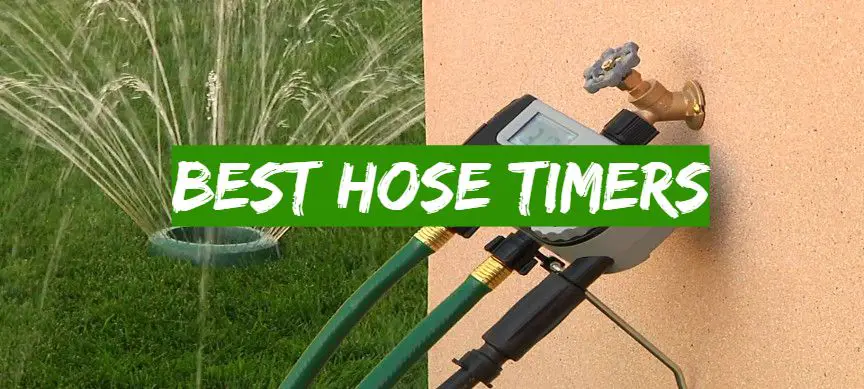





Leave a Reply
View Comments